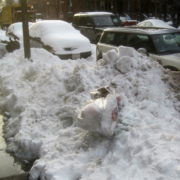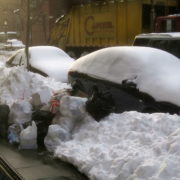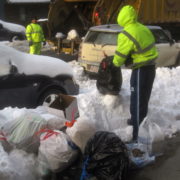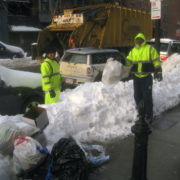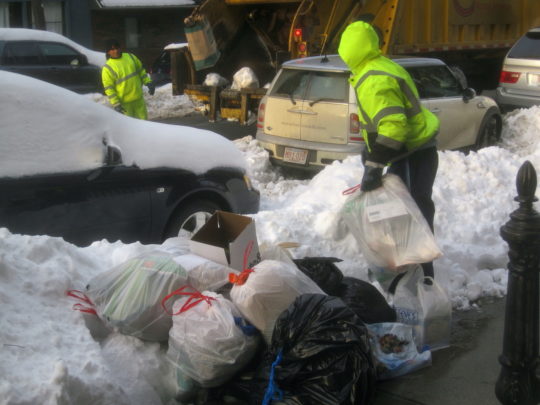Archive for January, 2011
Talkin’ Trash
Book Chapter: Human-to-Human Service
Posted: 01/28/2011
While walking the streets of Boston today, I noticed all of the people whose jobs are a lot more difficult because of the snow banks and the narrow, icy sidewalks. This blog post is dedicated to everyone who works outside in the mess that is winter. To the mailman navigating the narrow sidewalk with his cart in tow; the cab drivers dropping off slow-moving passengers with impatient people beeping their horns behind them; the pizza delivery guy climbing over the snowbank; the Fedex, UPS and every other delivery driver negotiating icy stairs, the moving crews and construction workers; and especially all of the trash men and women climbing through the snow and throwing the trash over the piles of snow to the truck.
Waltham Street is a one-way side street in Boston that is always fertile ground for a confrontation on trash day. On many occasions I’ve seen the huge, yellow trash truck turn the corner onto the street and stop so the workers can pick up trash from the curb. Moments later a car turns onto Waltham St. and encounters the truck blocking the road, and instead of backing up onto Tremont St. many drivers will lean on their horn, or worse, get out of their car and scream at the trash crew. Their job is hard enough without being yelled at and threatened. The next time it happens, I’m going to take pictures of the offenders and their cars (and license plates) and dedicate a blog post to THEM.
I had a chance to briefly chat with Vladimir and Nilson, the two guys in the picture below as they were working today. Despite getting yelled at a good portion of the day and working around the huge piles of snow, they both had a great attitude. I promised them I would say hello and feature them here in today’s post. Thank you for doing a great job guys, despite the terrible conditions. Enjoy the weekend.
Are there any workers impacted by the winter weather that you’d like to recognize?
Permalink | Posted in Human-to-Human Service | 18 Comments »
The Lot of Humanity
Book Chapter: Human-to-Human Service
Posted: 01/17/2011
The most enjoyable aspect of writing this blog and working on my book is the people I have met who have shared their ideas, stories and comments.
One of those people is fellow blogger, Ruth Tobias a former Bostonian who now lives in Denver, Colorado covering the dining scene in Denver and beyond in her popular blogs, Denveater and Globeater.
Over the summer I received a facebook message from Ruth recommending that I contact Meghan Eckman, the producer of The Parking Lot Movie. Ruth viewed a screening of the film and had a strong hunch that it would resonate with me. She was right – I loved it.
The Parking Lot Movie is a brilliant 74-minute documentary set in The Corner Parking Lot (CPL) in Charlottesville, Virginia. It chronicles the experiences of an eccentric group of introspective parking lot attendants whose traits range from ingenious to maniacal. Their home base is a tiny booth likened to ‘an outpost you might see on the Albanian border’ near the University of Virginia.
From The Parking Lot Movie website: …the assortment of overeducated attendants who work at The Corner Parking Lot have to deal with throngs of drunken frat boys, vandals, and SUV-driving jerks who either take off without paying or fight them over sums as low as $0.40. Fortunately in this establishment the normally agreed upon rules of customer service don’t exist. Disrespect the staff and face the consequences. To these parking attendants, it’s about more than just getting the money. It’s about respect, honor, and decency toward your fellow man.
As a documentary, The Parking Lot Movie works as a discourse on North American life through the lens of a parking lot. It serves as a metaphor for America, containing both our noblest of intentions and our basest of instincts. In what becomes an irresistible parody of existentialism and sociology, these highly educated parking lot attendants consider their work at the parking lot to be an opportunity to contemplate impermanence, detachment and the concept of fundamental self. Meanwhile, they judge cars and drivers—both of which have come to represent the pervasive culture of entitlement they abhor. It examines humanity and the existential implications of a job – any job.
Meghan and her team worked on the film for 3 years, editing 150 hours of footage including in-depth interviews with lot owner, Chris Farina and several of his employees. Recognizing that the customer is not always right, Farina respects his employees and values them more than his customers.
Attendant Rick Slade on Chris Farina: Chris’s genius was in identifying and relating to people and getting them to relate to him as a person, not a boss, not the owner, not an authority figure, but as a friend and someone that you wanted to be loyal to because you had such a strong stake in the operations. You cared about the place.
My strong visceral connection with this film stems from experiences in my own life and the stories from the lives of servers that will be included in my forthcoming book.
Here are a few important themes in the film, along with quotes from the attendants and producer, Meghan Eckman:
1. We are not always defined by what we do for compensation.
One of the customary questions we ask people we meet for the first time is, “What do you do?” The answer often has little or nothing to do with who we are.
While working at several jobs throughout my life, I’ve endured several degrading comments about my work not being a ‘real job’.
John Bylander: Just because you see me at my job doesn’t mean you know what my life is about.
Rick Slade: You develop a strong sense of self and you get to know who you are fundamentally in the absence of any other external trappings or anything that socially people recognize that typically frames our identities and makes us who we are…I really became comfortable with myself beyond whatever society might have thought I was or what I was supposed to be doing.
Chris Farina (Parking lot owner): Whenever someone asks me, “What do you do?”, my first inclination is to laugh. I still do.
2. Condescension, Elitism & Entitlement
Unfortunately the stinging comments made by the 20% of customers who are impolite, disrespectful or downright rude, linger with us long after the customers leave. I still remember the condescending, gratuitous comments made by customers when I was working as a bartender, restaurant manager and painting contractor such as, “Good thing you went to college”, implying that I wasted my time pursuing a degree at Wesleyan.
Matt Datesman: Recalling one of his most demeaning customers: [On] graduation day, dad driving the car, and the whole family’s in the car, and him saying, I kid you not, saying “You know if you got a college degree you wouldn’t have to do a job like this.”
Harper Hellems: Once that gate goes up and a car comes in, people apparently enter this no-man’s land of a place where civic order and rules cease to apply. … There is something to be learned by being debased… [by] people who are jerks. …Everyone should have a set of keys thrown at them by a fat, rich guy with a popped up pink collar.
John Lindaman: … the thing that made me angry was generally that it was rich, entitled people coming and wanting to exploit you because you were of a lower socio-economic class. This sort of smug entitlement really started to make my blood boil.
Scott Meiggs: Maybe you shouldn’t have bought your kid that Range Rover…Maybe you should have thought about it because we see why you’re kid’s a bastard.
Meghan Eckman in an interview with Shaun Hatton from Electric Playground: I’d like people to come away thinking about the notions of entitlement – treating people in the service sector with a certain amount of respect and dignity.
3. Social Contracts
There are social contracts that govern all cultures, and civil human beings are expected to adhere to them. From poor tippers to people who try to park in a pay lot for free, some people try to scam the system and rationalize their boorish behavior wherever they go. Disagreeing with social contracts is no excuse for ignoring them.
Meghan Eckman (EP Interview): When you park there you agree to pay and some people don’t acknowledge that.
Immediately after Meghan’s comments, they cut to a clip of a female customer arguing with a parking lot attendant about how much she owes. Ironically, the bumper sticker on the back of the woman’s SUV reads, “Proud of my Eagle Scout.”
4. Solitude and Detachment on the Job
John Lindaman: People were definitely seriously considering the existential implications of the job which were, What does it actually mean? Where does it fit in?
Tyler Magill: The job is long periods of tedium punctuated by brief moments of “Fuck you, buddy.” [When people drive off without paying, etc.]
5. The Silent Interaction
Gray Morris: Constantly people just won’t say one single word to me throughout the entire interaction…
I was talking with a worker in a sub shop last week when a customer walked up to the counter while reading the menu above the worker’s head. The employee said, “Good afternoon, sir. What can I get for you?” The customer said nothing, creating a 30-second awkward tension for the rest of us in the shop. Is it really that hard to say, “Hi, I just need a moment please.”?
I’m going to dedicate a future blog post to this topic called, “The Silent Treatment.” I see it happen frequently between customers and employees. ‘Hello’ and ‘Thank you’ are easy.
6. Customer Stupidity
Gray Morris: People say, “Hey, where it says, ‘No Parking’, Can I park there?”
You can’t make this shit up. Every workplace has these crazy customers, and it’s therapeutic to talk about them.
(Gray’s tirade about the customers he hates is hilarious and one of my favorite scenes in the film.)
7. Anonymity
In the wake of the horrific shootings in Arizona, ‘public discourse’ is all the rage. However, I’m more interested in ‘private discourse’, the way people interact when they don’t think anyone is looking.
Out of curiosity (and for research), I spy on people all the time when they are interacting with workers. A lot of people use anonymity as a cover for their bad manners and poor behavior.
James McNew: When you’re walking down the street, it’s not like if you bump into somebody you start screaming at them and giving them the finger to their face. But when you’re in a car, you seem to have this super power.
People who hide behind their cars, telephones and keyboards to spew anonymous rage and vitriol are the same people who litter when no one is looking and treat service industry workers as subservients.
8. Bitterness and Burnout
The ranting, stereotyping and judging by the attendants in the film results from their accrued anger and bitterness from years of interacting with the public. I get it, but some of it is over the top. It would have been nice to hear a few stories about some of the great customers who visited The Corner Parking Lot. I’m sure there were more than a few parkers who were Customer Hall of Fame eligible.
Chris Farina (Owner CPL): There are plenty of people [attendants] that have taken it too far and that usually means it might be time for them to go, (laughs) or they need to work a little less or they need a vacation so they can get a proper balance and realize it is just a parking lot…
John Lindaman: When you know it’s time for you to move on, then you have to follow that…It’s not up to you to make sure that person gets their just desserts. You start to have a slightly more nuanced sense of cause and effect. It’s best to go ahead and let that person go on down the road because you’re not the one responsible for meting out the effect. That’s a mechanism of the universe.
I’ll have a lot more to say on this topic in a chapter called, “Confronting Without Confrontation.”
The Parking Lot Movie and a mandatory 1-month stint in a service industry job should be required for high school graduation. The material in this film could generate healthy discussions and in turn, result in valuable lessons for life.
In addition to providing some very insightful content, this documentary, replete with its irreverent band of misfits, is entertaining and funny.
Harper Hellems: No one’s parents looked down at the crib of their newborn child and said, “God I wish my son or daughter grows up to be a parking lot attendant.”
If you’re interested in human dynamics and astute, wistful observations about society and life, watch this film.
It’s not just a parking lot. It’s a battle with humanity.
John Lindaman (Attendant for 11 years): It kind of taught me how to be a human being.
I’d love to hear from Chris Farina, current and former CPL attendants and workers from around the world.
As of Monday afternoon, 1/17, The Parking Lot Movie was #1 on the Netflix list of Most Popular in the Last 24 Hours list.
Please share your comments and stories. Thank you.
Permalink | Posted in Human-to-Human Service | 10 Comments »
